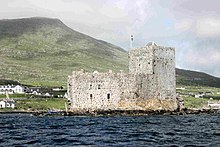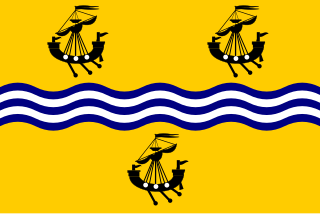
The Outer Hebrides or Western Isles, sometimes known as the Long Isle or Long Island, is an island chain off the west coast of mainland Scotland. The islands are geographically coextensive with Comhairle nan Eilean Siar, one of the 32 unitary council areas of Scotland. They form part of the archipelago of the Hebrides, separated from the Scottish mainland and from the Inner Hebrides by the waters of the Minch, the Little Minch, and the Sea of the Hebrides.
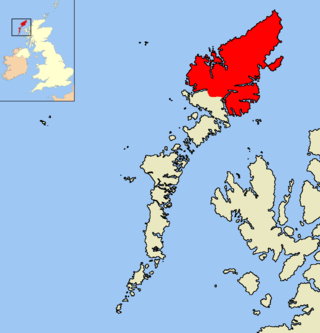
The Isle of Lewis or simply Lewis is the northern part of Lewis and Harris, the largest island of the Western Isles or Outer Hebrides archipelago in Scotland. The two parts are frequently referred to as if they were separate islands. The total area of Lewis is 683 square miles (1,770 km2).

Harris is the southern and more mountainous part of Lewis and Harris, the largest island in the Outer Hebrides, Scotland. Although not an island itself, Harris is often referred to in opposition to the Isle of Lewis as the Isle of Harris, which is the former postal county and the current post town for Royal Mail postcodes starting HS3 or HS5.

Benbecula is an island of the Outer Hebrides in the Atlantic Ocean off the west coast of Scotland. In the 2011 census, it had a resident population of 1,283 with a sizable percentage of Roman Catholics. It is in a zone administered by Comhairle nan Eilean Siar or the Western Isles Council. The island is about 12 kilometres from west to east and a similar distance from north to south. It lies between the islands of North Uist and South Uist and is connected to both by road causeways. Benbecula's main settlement and administrative centre is Balivanich.

Uist is a group of six islands that are part of the Outer Hebridean Archipelago, which is part of the Outer Hebrides of Scotland.
Berneray is an island and community in the Sound of Harris, Scotland. It is one of fifteen inhabited islands in the Outer Hebrides. It is famed for its rich and colourful history which has attracted much tourism. It lies within the South Lewis, Harris and North Uist National Scenic Area, one of 40 such areas in Scotland which are defined so as to identify areas of exceptional scenery and to ensure its protection from inappropriate development.
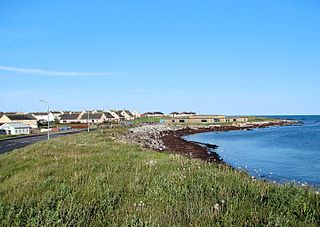
Balivanich is a village on the island of Benbecula in the Outer Hebrides off the west coast of Scotland. It is the main centre for Benbecula and the adjacent islands of North Uist, South Uist and several smaller islands. Balivanich is within the parish of South Uist.

Lochmaddy is the administrative centre of North Uist in the Outer Hebrides, Scotland. Na Madaidhean are rocks in the bay after which the loch, and subsequently the village, are named. Lochmaddy is within the parish of North Uist.

Carloway is a crofting township and a district on the west coast of the Isle of Lewis, in the Outer Hebrides, Scotland. The district has a population of around 500. Carloway township is within the parish of Uig, and is situated on the A858.

Na h-Eileanan an Iar, formerly the Western Isles, is a constituency of the Scottish Parliament (Holyrood) covering the council area of Na h-Eileanan Siar. It elects one Member of the Scottish Parliament (MSP) by the first past the post method of election. It is also one of eight constituencies in the Highlands and Islands electoral region, which elects seven additional members, in addition to the eight constituency MSPs, to produce a form of proportional representation for the region as a whole.
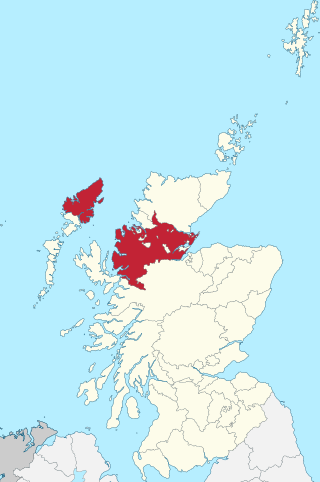
Ross-shire is a historic county in the Scottish Highlands. The county borders Sutherland to the north and Inverness-shire to the south, as well as having a complex border with Cromartyshire – a county consisting of numerous enclaves or exclaves scattered throughout Ross-shire's territory. Ross-shire includes most of Ross along with Lewis in the Outer Hebrides. Dingwall is the traditional county town. The area of Ross-shire is based on that of the historic province of Ross, but with the exclusion of the many enclaves that form Cromartyshire.

Inverness-shire is a historic county, registration county and lieutenancy area of Scotland. Covering much of the Highlands and Outer Hebrides, it is Scotland's largest county, though one of the smallest in population, with 67,733 people or 1.34% of the Scottish population.

Elections to Comhairle nan Eilean Siar (Western Isles Council) were held on 3 May 2012, the same day as the other Scottish local government elections. The election was the second one using the 9 wards created as a result of the Local Governance (Scotland) Act 2004. Each ward elected three or four Councillors using the single transferable vote system: a form of proportional representation. A total of 31 Councillors were elected.

Elections to Comhairle nan Eilean Siar (Western Isles Council) were held on 4 May 2017, the same day as the other Scottish local government elections. The election was the third one using the nine wards created under the Local Governance (Scotland) Act 2004. Each ward elected three or four Councillors using the single transferable vote system: a form of proportional representation. A total of 31 Councillors were elected.

Barraigh, Bhatarsaigh, Eirisgeigh agus Uibhist a Deas is one of the nine wards used to elect members of the Comhairle nan Eilean Siar. It elects four Councillors.

Beinn Na Foghla agus Uibhist a Tuath is one of the nine wards used to elect members of the Comhairle nan Eilean Siar. It elects three Councillors.

Elections to Comhairle nan Eilean Siar took place on 5 May 2022 on the same day as the 31 other Scottish local government elections. The election was the first to use the nine wards created under the Islands (Scotland) Act 2018 which allowed for single and dual member wards, with 29 councillors being elected. Each ward elected either 2, 3 or 4 members, using the Single Transferrable Vote electoral system, a form of proportional representation. Following a boundary review the number of wards will increase from nine to 11 while the number of councillors elected will fall from 31 to 29.









